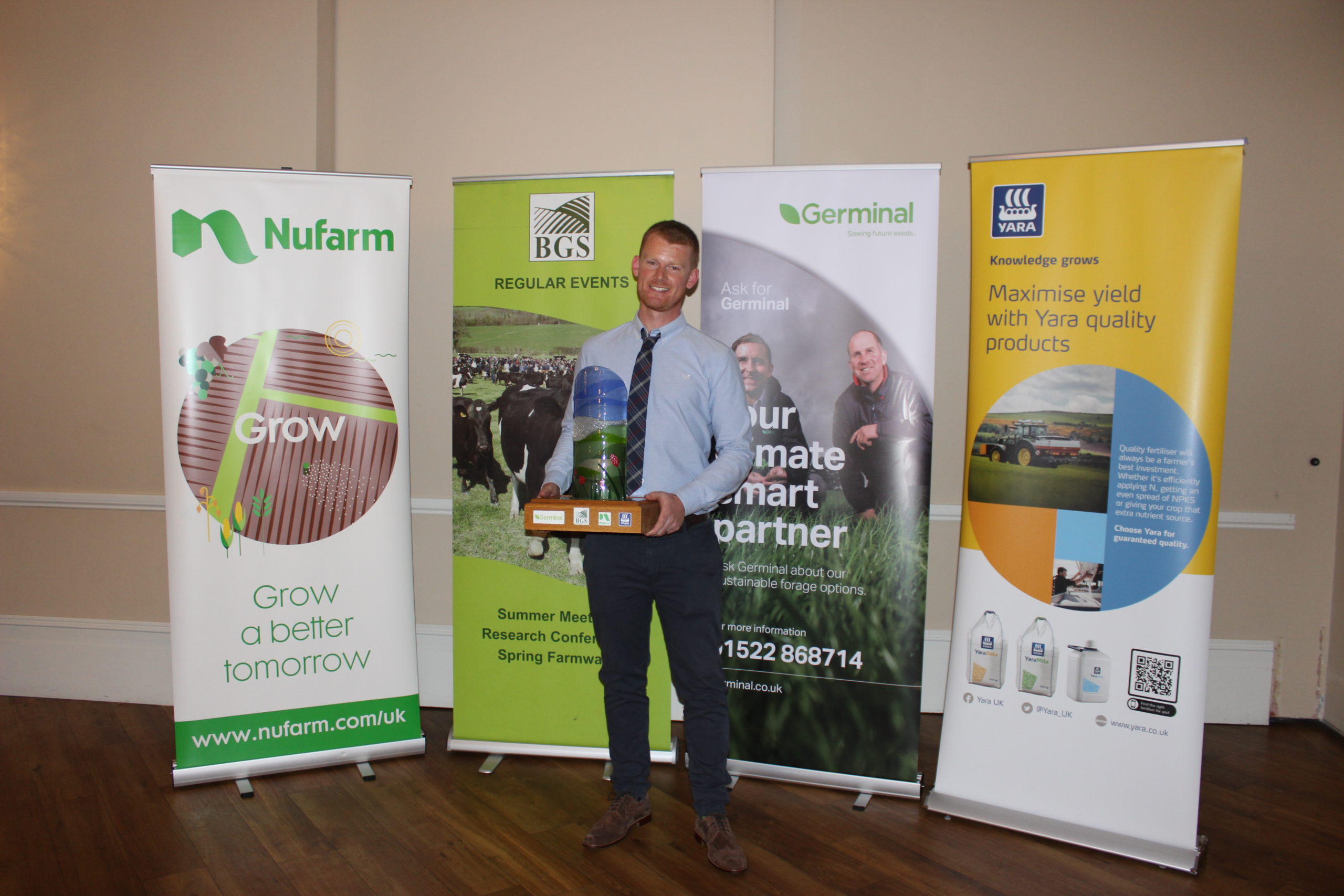The winner of the prestigious BGS Grassland Farmer of the Year competition for 2023 is Robert Black from Drochil Castle Farm, West Linton, Peeblesshire in Scotland. He was announced as the winner at an Awards Dinner jointly hosted by BGS and Cardigan and District Grassland Society at The Cliff Hotel and Spa, Gwbert on Wednesday 25 October which was attended by 80 guests. The competition and the Awards Evening are kindly sponsored by Germinal, Nufarm and Yara.
Robert Black farms alongside his father David, running a herd of 120 Stabiliser suckler cows and a flock of 1000 Highlander ewes on just over 500 hectares (1250 acres), with both replacement heifers and ewe lambs being home-bred. The farm extends up to 445 metres (1460 feet) with almost half the land being permanent pasture. Forage rape, barley and Italian ryegrass with red clover are grown in a six-year rotation on the flatter, lower areas of the farm. The cows and the ewes are outwintered on deferred hill grazing with silage bales that are placed there in the summer, and no concentrates are fed to either. During the summer months, large mobs are paddock grazed on 4 hectare breaks with ewes and lambs grazing ahead of the cattle. Lambing takes place outdoors in April, and all lambs are finished off forage crops, usually before the end of the year. Cows calve in May, and the bull calves are left entire and finished at 12-14 months of age on a mix of forage and home-grown barley. Heifers not required for breeding are sold at 18 months of age.
Head judge Hugh McClymont said that Robert was on an upwards trajectory having increased both the technical and the financial performance of the farm. He also said that Robert had his head firmly on his shoulders and his feet on the ground.
It was a very close competition again this year, and the runners-up were Gordon Mitchell from Ulster Grassland Society and Richard Morris from Cleddau Grassland Society.
Gordon Mitchell farms 42 hectares near Banbridge in County Down where the 80 Holstein Friesian cows produce an average yield of 7791 litres. Cows calve from September through to March. With a high stocking rate of 2.5 cows/ha grass is measured weekly to ensure that the correct amount is allocated for the herd. Pre-mowing is also being practiced. Investment has been made in cow tracks, multiple access points to paddocks and additional drinkers. Three cuts of silage are taken each year and fed to cows in a TMR during the winter. A specific dry cow silage is also made. Hugh McClymont said that the Mitchell family were utilising data collected to manage the farm and commended them on their excellent pasture management.
Richard Morris runs a herd of 550 Holstein Friesian cows at Bowett Farm, Hundleton near Pembroke. The average yield per cow is 7800 litres. Cows calve between September and December. They are turned out in mid February and housed from the end of October. Grass is measured weekly, and a paddock grazing system is used, with fresh grass allocated every 12 hours. To aid this there are Astroturf cows tracks and different gates into and out of paddocks. With some land across a busy main road, an underpass had been constructed to extend the grazing platform and reduce the time taken to bring cows to the parlour, whilst also reducing the disruption to car drivers on the road. Hugh McClymont commented on the high quality of the reseeded area on the farm, and Richard’s use of home-produced nutrients to reduce the need for chemical fertiliser.
In summarising, Hugh McClymont stated that the judges had visited three fantastic farms in three very different locations. All the judges were in agreement that the three farms were a credit to the grassland industry, showing what could be done from a technical, financial and environmental perspective.



